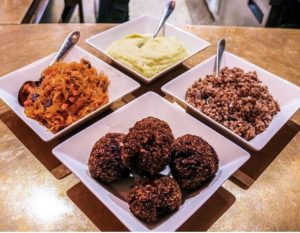BY SARAH SAKHA
“I’ll be in the red bandana.”
His note had been short, but bold. I spotted Ruslan as soon as I walked into the coffee shop, with his bright red bandana, thick-rimmed crimson glasses, a gray hooded jacket, dark stubble, and a soft smile that matched the laugh lines around his hazel eyes. He has asked me not to use his last name, for concerns about his safety.
Ruslan emigrated from Russia to the United States three-and-a-half years ago, applying for asylum and attaining asylum status once on American soil. He arrived here all on his own – with no English and no connections.
“Ninety-night percent that I have in my life now I did myself,” he said. “Sometimes I even just Googled how to do it and did it myself.”
In St. Petersburg, Russia, Ruslan was a talented designer for a publishing company. But when he came to the States to start anew, he sought a change. He had the opportunity to pursue another passion of his — to pursue a blank slate. He recalled working at Le Pain Quotidien back in Russia, and had always loved cooking, which began with his family.
“I grew up between Western cuisine, Russian cuisine, and Middle Eastern cuisine,” he said. His father taught him about Greek and Turkish cuisine, his mother about French cuisine, his grandmother about baking. Beyond that, he is self-taught – from books, conversations with people, and trials at different restaurants.
“I’m the one who’s cooking – for birthday parties, holidays, gatherings,” he said. “I like to get the best out of different countries and places and put it all on the same plate. For me, it’s awesome.” He has catered for several events, led three Thanksgiving dinners, and even taught his own cooking classes. With a big smile and grand gestures, he talked about his last trial, where he says he “blew the pastry chef’s mind” by making four complicated recipes in three hours, including a Pavlova cake, mango sorbet, and candied lemons for cookies, all from scratch. Focused and fast, and even without the formal culinary education he often wishes he had, he delivered.
So the chef hired Ruslan. We spoke the week before he was to begin his new role as a pastry chef at The Standard Grill in New York City’s Meatpacking District. Today, he is confident in his place both in the kitchen and in the United States – a tangible, contagious confidence and ease that he credits to the work of Emma’s Torch and the “family” he found there, given that he doesn’t have much of that in the United States.
“Emma’s Torch gave a sense of confidence in the kitchen and in myself that I can do a lot,” Ruslan said, with a beaming smile. “My worth as a human, as a cook, is no less than any other.” He described a stark contrast between the environment at Emma’s Torch and that of other restaurants, the latter being one where cooks would get constantly yelled at, rushed, and rebuked for their mistakes. In a more muted tone, he expressed how that would be a nerve-wracking experience for anyone, let alone for an immigrant who felt as though he could not express himself clearly in English. But then he spoke with great pride and at great length about being asked to do not one, but three graduation dinners at Emma’s Torch, where the students showcase their work after completion of the program. For his final dinner, he designed and made a four-course meal from scratch, using his hands to demonstrate the extent of the spread. He drew from Russian and Middle Eastern sources for inspiration for a crab-based salad and spicy eggplant appetizer.

A traditional Russian spread prepared by Ruslan for a graduation dinner at Emma’s Torch.
Source: Instagram
Going forward, he wants to get as much working experience as he can, to excite people through his own fusion cuisine and to open his own restaurant. He pointed out “the opportunities this city gives to anybody, regardless of where you’re from or what you’re doing.”
“For me, cooking for someone, no matter who that is, is some sort of communication to that person,” he said. Through his cooking he wants to push people “to be more accepting, to try things differently, to be open-minded.”
“That is the spirit of New York for me – to accept things that are not familiar to you,” Ruslan said. “That is what I’d like to do through cooking.” He has felt self-conscious about his English at times, looking to food as his primary language, but he remains steadfast in his self-confidence and in his own identity, as shaped by his cooking.
“I feel myself [to be] a chef-immigrant because I am a chef, but I am not from here, and I am ready to bring something new here…something not written in the books,” he said.